“Even though the facility had kept the virus out of the building so far, the pandemic was killing my dad.”
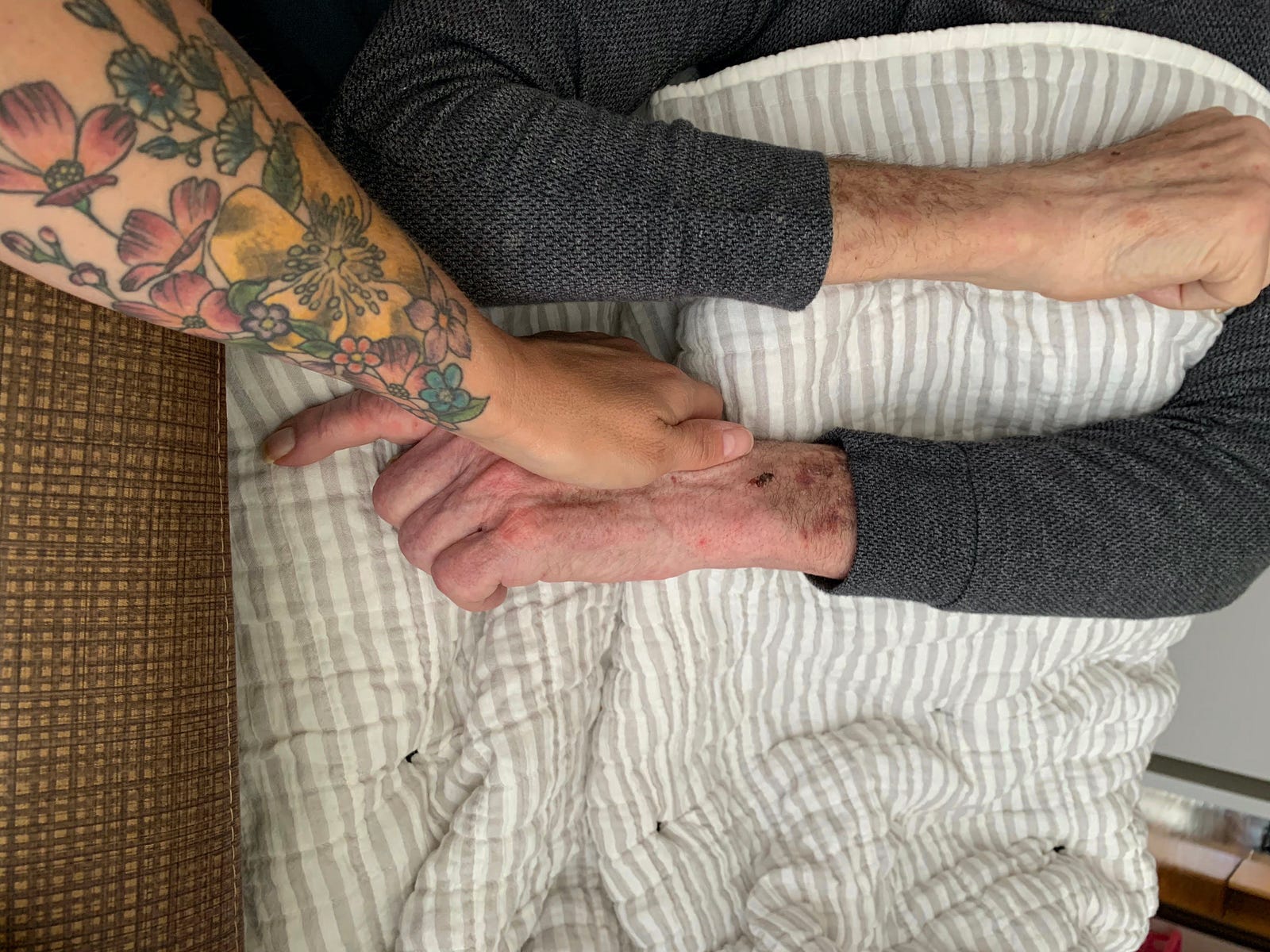
The first time I saw my father at his memory care facility, after ten weeks of Covid-19 lockdown, he sat at the breakfast table, slumped in his wheelchair. He wore only a hospital gown, hospital-issued socks with treads, and a blanket draped over his shoulders. When the blanket slipped away, gooseflesh rose on his bare arms. And his arms were marked with purple bruises.
He was only 72. He had just gone into hospice when the pandemic hit.
I hurried to get him back to his room, horrified by his state of undress. He was bound to be freezing. Where were his shoes?
“He didn’t eat,” the caregiver called behind me. “He refused to eat.”
I caught the familiar smell of the place — urine, disinfectant — as we breezed down the hall. The gown was the flimsy version with ties down the back. I saw a pale strip of his yellowing skin, the knuckles of vertebrae along his spine, and raced toward his clothes.
“They have to let us visit,” I’d insisted to my brother. I’d emailed the facility director to beg. I’d gotten no response and assumed the facility was overwhelmed because of the pandemic. I trusted my dad would receive all those extra services intended to comfort hospice patients.
All those residents with families who weren’t allowed to go in … How could they not let us go? But we couldn’t.
“They have to let us visit,” I’d insisted to my brother. I’d emailed the facility director to beg.
My father’s room seemed the same, mostly unchanged, except for the cards I had written and mailed during lockdown. It crossed my mind that someone opened them and propped them on his dresser without reading them aloud. They probably thought, What difference does it make?
The dresser drawers, I found, were empty. No clothes. None. The top drawer had a couple mismatched socks, a random red one I’d never known to have a mate, and a black dress sock, silky and smooth like my dad used to be. Before vascular dementia and blindness brought him to this place.
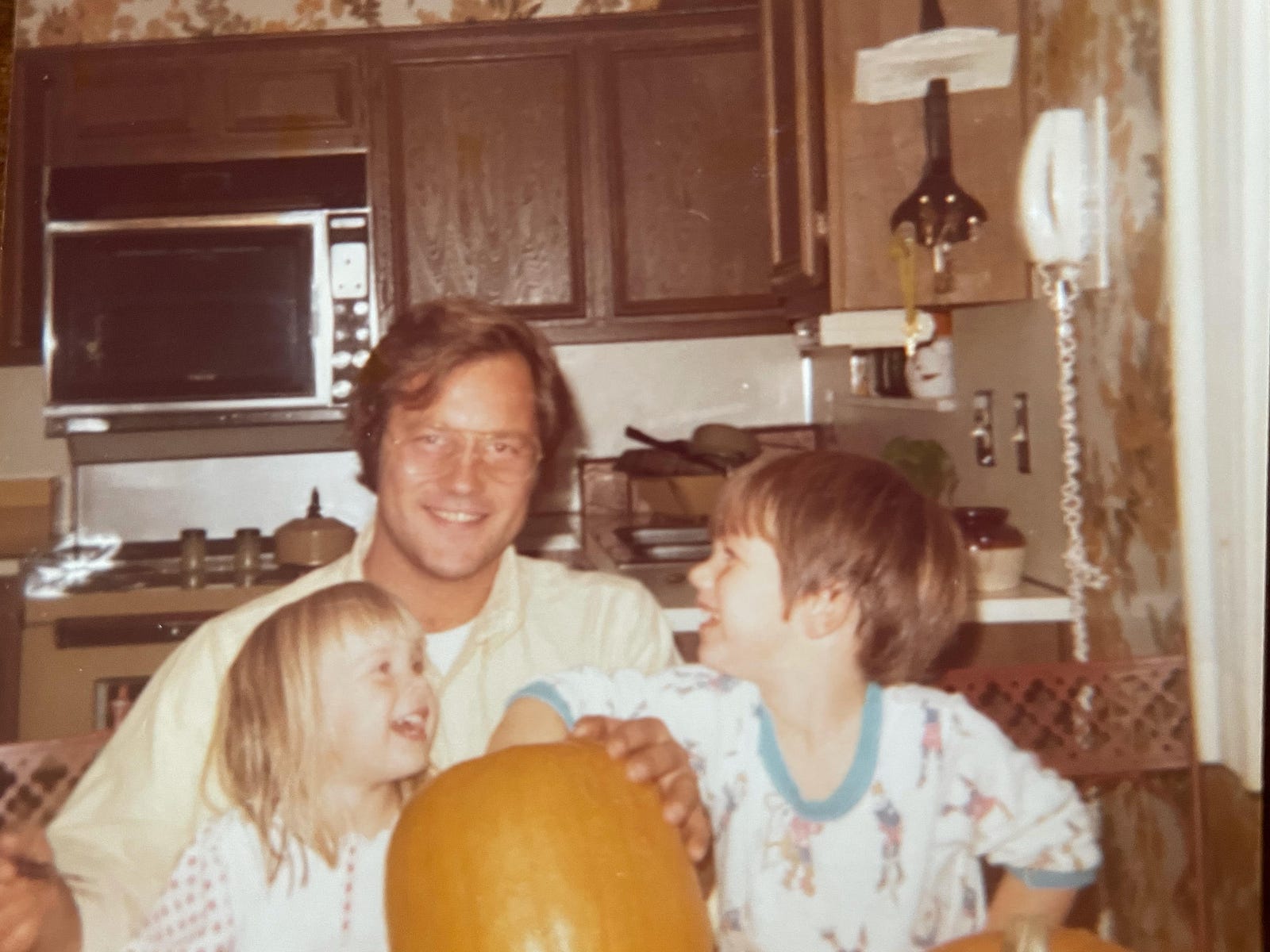
Without options, I wrapped the blanket tightly around him, hugging him, wondering if he knew my voice. I found a second blanket and covered his lap and legs.
I knelt to pull off a hospital sock, revealing his gnarled toenails, curved and bent. It looked as if the big toenail had grown itself into a loop, back into skin. I quickly pulled on the red sock to hide what I’d seen. He grimaced, his first real reaction to me. I’d hurt him. By pulling a sock over his toes, I’d hurt him.
He needed to eat, so I opened the snack drawer, picked over, mostly depleted. I unfolded the top of a half-eaten bag of Fritos. In the mini-fridge, I found a re-capped Sprite and hoped it still had some fizz.
We both understood nourishment, and for this, he was grateful.
Dragging the guest chair to his wheelchair, I sat down. He’d transitioned into hospice care just as lockdown began. Then, ten weeks locked out. For him, ten weeks locked in. He’d sunk further into himself, disappearing.
“It’s me, Dad,” I said. I said my name, but even I didn’t know who that was. It was a stupid approach anyway. Better to get to business. “Do you want a Frito?” I touched his lip with the edge of a chip. He opened his mouth for it and chewed. Slowly. Swallowed. I fed him the rest of the bag, one by one. I tipped the green bottle to his mouth.
When he’d finished the last drop, he turned his gaze to meet mine for the first time. We both understood nourishment, and for this, he was grateful.
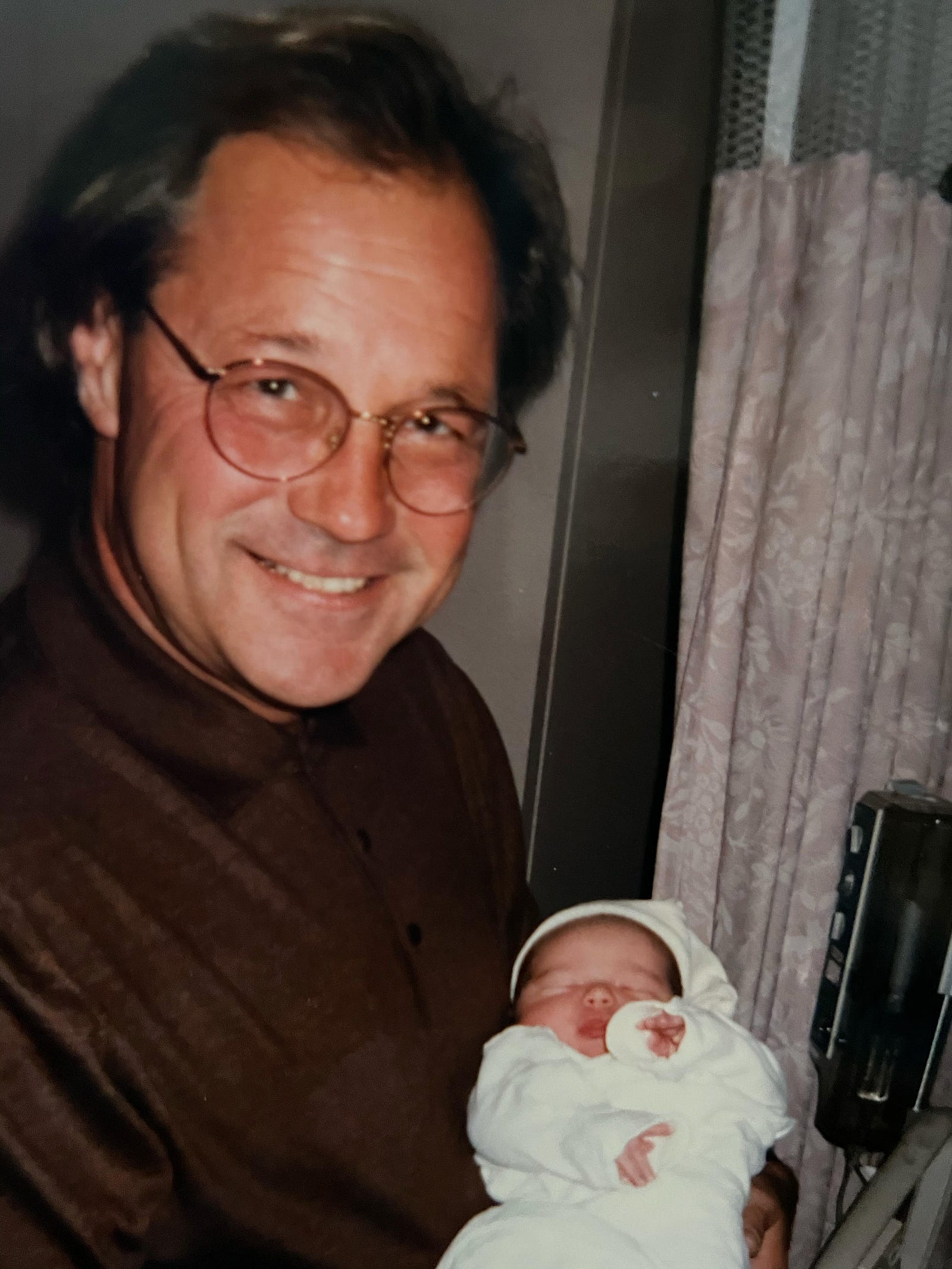
*******
So many revelations came with an “It wasn’t until.”
It wasn’t until … his caregivers hurried in with a bag of clean clothes, only some of them belonging to my dad. The pandemic, they explained, had left them so understaffed they couldn’t keep up with laundry. They’d lost track of whose was whose…
It wasn’t until … they’d explained the communication breakdown: that hospice patients could have visitors during lockdown, albeit one at a time, and they’d thought about calling us sooner to find out where we were.
“We’ve all been wondering …”
“We wondered …”
“I thought maybe I should call …”
It wasn’t until … I raced home to raid my oldest son’s closet for discarded — size small — track pants and sports shirts. I hauled them back in a trash bag. I dressed my dad in the bright blue Lululemon. I’d been hoping my son would like it because it matched his eyes. He hadn’t. My dad didn’t have blue eyes but, still, it looked stunning. A dazzling aquamarine against his flash of white teeth …
It wasn’t until … my frantic phone call with the hospice nurse, my aunt watching from across my father’s bed (“E-lizabeth, be assertive,”), when they finally prescribed scheduled doses of morphine to keep him comfortable instead of writhing and screaming, eyes wide, with no sound…
It wasn’t until … I learned that only the podiatrist was allowed to cut residents’ toenails, and podiatrists were excluded during lockdown because they weren’t essential …
It wasn’t until all of this happened that I realized: Even though the facility had kept the virus out of the building so far, the pandemic was killing my dad.
*****
What does “essential” mean, anyway? In the United States, we know it didn’t mean having a president who was truthful about the dangers of Covid-19 and its likely spread. We know it doesn’t mean agreement from healthcare experts about what masks can do to protect the wearers — and the people with whom they come in contact. We know it doesn’t even mean clean laundry for the sick and dying, a decent meal, or help preventing your own toenails from growing into your skin. Let alone the right to be surrounded by loved ones at the end.
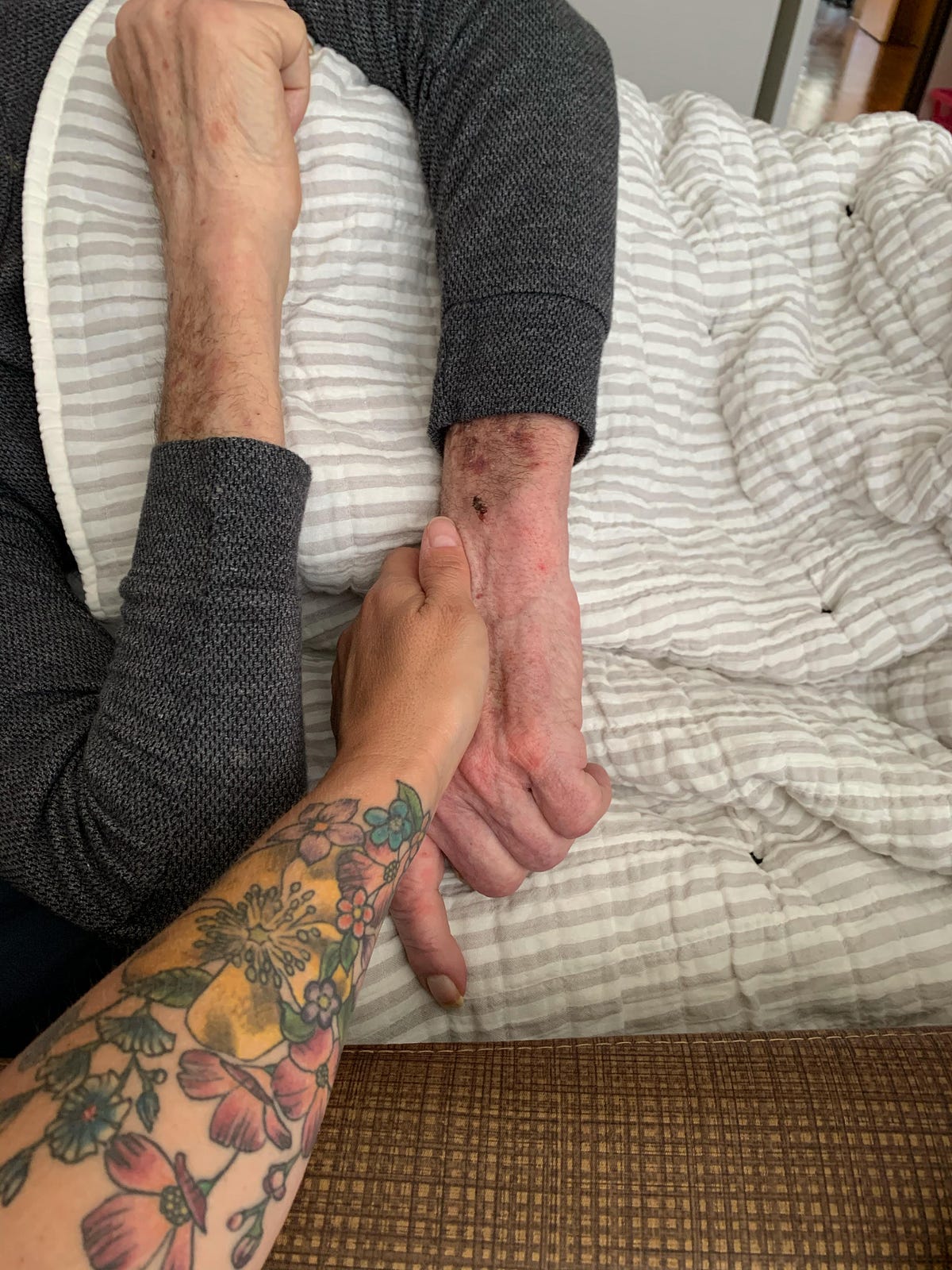
That day, I loaded up a white canvas bag with nail clippers, a nail file, foot cream, and scented oils. I filled a plastic bowl with warm, soapy water. I washed my father’s gnarled toes with a white washcloth.
I hoped he’d enjoy it, but he winced and braced himself for pain. It took me an hour to cut them to size, a stressful time spent praying I wasn’t cutting skin. It was impossible to tell. When I was done, I massaged his feet with lotion and resocked with a pair of my son’s sturdy black Hanes, tucking the blanket around them like fragile newborn twins.
I sat beside him. We listened to the first radio episode of the American Top 40 countdown on satellite radio. Marvin Gaye — “End of Our Road.” Aretha Franklin — “Spirit in the Dark.” Stevie Wonder — “Signed, Sealed, Delivered.” Rare Earth — “Get Ready.” The Beatles — “The Long and Winding Road.”
The number one song in the countdown? Three Dog Night — “Mama Told Me (Not To Come).” The song is about a wild party and includes a lyric about keeping the lights off to avoid a spotlight on the mayhem. It’s funny how the meaning of a song can morph depending on the time and place. How I wished, for my sake and my dad’s, we could close our eyes to the chaos of the world during his final days.
My father died on July 8, 2020. He died during a pandemic, though not from Covid-19. There are many ways the virus can take our loved ones away.
I had to let my father go. But at least I got to go in and see him before the end. At least I was essential, if only for a moment.
********************************************************************
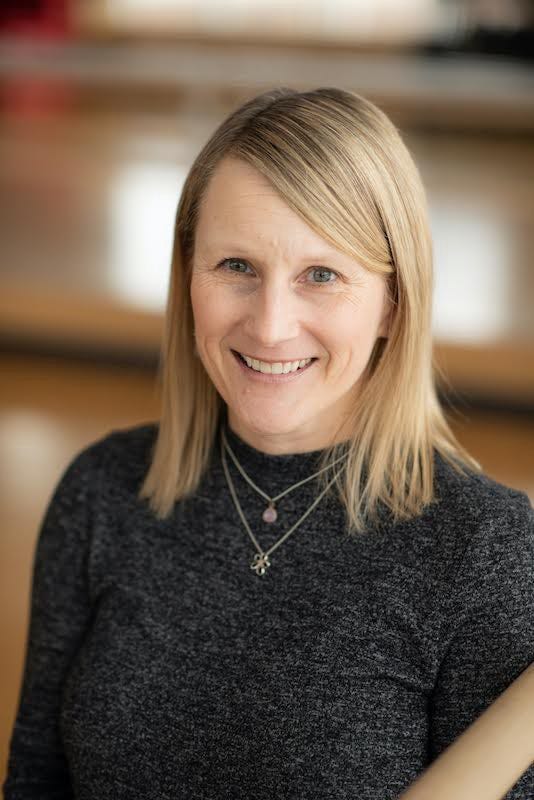
Beth Uznis Johnson’s short fiction and essays have appeared in Best American Essays 2018, Cincinnati Review, Story Quarterly, Mississippi Review, Southwest Review, Gargoyle, The Rumpus, and elsewhere. She was the recipient of the 2017 McGinnis-Ritchie Award from Southwest Review and a finalist in the 2019 Mississippi Review fiction contest.
********
Author photo by Edda Pacifico.








